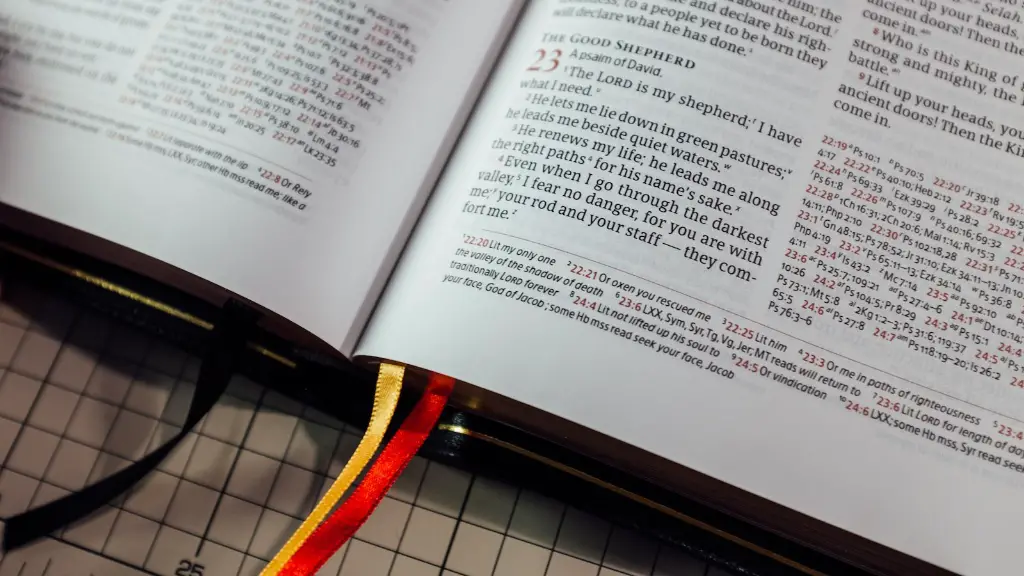Jethro In History
Jethro, a Midianite of the Kenite clan, is mentioned in the Bible only a handful of times. He is best known for being the father-in-law of Moses, who lived during the Hebrew Exodus from Egypt. Even through sparse scriptural references, Jethro has become an important figure in the history and traditions of the region.
Scholars have long argued about Jethro’s position and role in the Bible, with some suggesting that he may have even served as a priest at the local temple of YHWH. Jethro has traditionally been recognized in Jewish and Christian traditions as a wise and spiritual leader.
Jethro’s influence on Moses is a key part of his legacy; the two men met when Moses was fleeing Egypt and Jethro was tending his flock in the wilderness. After hearing of Moses’ exodus, Jethro gave him advice on how to organize the leaders of the Israelite camp. This advice was important in Moses’ successful leadership of the Israelites.
In addition to his role in the Exodus, scholars point to Jethro as an early advocate for monotheism and religious tolerance. Jethro watched Moses perform miracles, yet he venerated both Moses and the God of the Hebrews. His welcoming attitude toward Moses was not unheard of; some suggest he was representing the larger view in the region at the time, which emphasized the need to get along despite differing cultural and religious backgrounds.
One of the most important aspects of Jethro’s legacy is that the biblical account of his life gives historians an important look into the area and time period of the Exodus. Jethro was a Midianite and Kenite, two distinct cultural and tribal groups who lived in the lands surrounding Israel in the 12th century BC. This was a period of great political and social turmoil, during which the Israelites were fleeing out of Egypt and headed towards the Promised Land.
He was a powerful figure in the region, and some scholars argue that his advice and aid may have been instrumental in Moses’ success. His kindness to Moses established a precedent of hospitality and tolerance that could be seen in many cultures throughout the Middle East in later centuries. Additionally, the account of Jethro in the Bible provides an example of how ancient people worked together despite their cultural and religious differences.
Jethro’s Daughters
Jethro is also known for being the father of Zipporah, the wife of Moses. This relationship was an unlikely one, as Moses was a Hebrew and Zipporah was a Midianite. Jethro and Moses’ union, which was formed by mutual respect and admiration, is seen as an example of early Middle Eastern diplomacy and cooperation.
Jethro had two other daughters who, along with their families, helped Moses and the Israelites on their journey to the Promised Land. Jethro was very protective of his daughters, and he prevented them from attending the ceremonies at Mount Sinai, which he deemed too dangerous. This may suggest that he was an early advocate for women’s rights and safety, as he was unwilling to subject them to unnecessary risks.
Jethro also welcomed the Israelites into his home and provided them with food and shelter when they needed it. This extended hospitality has made him one of the most revered figures in Middle Eastern tradition. He is seen as an example of how two different cultures were able to work together despite their differences.
Jethro’s daughters were also influential in the Exodus story. They pointed the Israelites in the right direction when they were lost in the desert, and they helped to prevent the Israelites from becoming ensnared in a poisonous snake’s nest. Due to their courage and kindness, many Middle Eastern cultures see them as important figures in the Exodus story.
Jethro in Religion
Jethro was an influential figure in the Bible and in Middle Eastern culture. He is mentioned in the books of Exodus, Numbers, and Deuteronomy. In these accounts, he is praised for his wisdom and his willingness to welcome the Israelites into his home.
Jethro is seen in the Bible as a wise counselor. He helped to guide Moses in practical matters and to remind him of the importance of obeying God. He was also an early advocate for religious tolerance in the region, as indicated by his acceptance of the God of the Hebrews.
Jethro has become an important figure in religion, particularly in the Jewish and Christian faiths. He is honored as a wise man who helped to guide Moses on his journey and as an advcocate of peace and tolerance. Many biblical scholars and theologians focus on Jethro’s influence in history and see him as an important part of the Exodus story.
Jethro is also seen as a precursor to the books of Proverbs and Wisdom, two parts of the Bible that focus on practical advice. He was influential in his own time, and his advice has been traditionally used to guide modern people in their own moral and ethical decisions. His wisdom and guidance continue to be relevant today, and his example serves to remind us of the importance of kindness and understanding.
Jethro In Popular Culture
Jethro is an important figure in modern culture and art. He is often depicted in paintings, films, and books as a wise and beneficent figure. He is seen as a symbol of hospitality and understanding in Middle Eastern culture.
The story of Jethro is also a popular topic in literature. His relationship with Moses is seen as a model for cooperation and diplomacy. His welcoming attitude to Moses and the Israelites is seen as a reminder to respect the beliefs and cultures of others.
Jethro is also a popular figure in music. Many contemporary musical artists have written songs about him. These songs often reflect on his influence and generosity and how he inspired Moses on his journey.
The example of Jethro has endured throughout the centuries and is still relevant today. He is seen as an important figure in the history of the Middle East and an example of how two cultures can work together to achieve mutual understanding and respect.
Jethro’s Legacy
Jethro has had a lasting impact on Middle Eastern culture and on the teachings of the Bible. His legacy is one of cooperation, understanding, and hospitality. He is often remembered for his willingness to help the Israelites on their journey and for his willingness to accept the God of the Hebrews.
Jethro has also become an important symbol in today’s culture. He is seen as an example of tolerance and understanding. His legacy reminds us to look towards peace and understanding between people of all backgrounds.
Today, Jethro is remembered as a wise and generous leader who helped guide Moses and the Israelites to the Promised Land. He is an example of how two cultures can come together and cooperate despite their differences. Jethro’s legacy extends far beyond his own time and serves as an important reminder of the importance of understanding and cooperation.
Jethro In The Modern World
Jethro’s life and legacy have continued to be relevant in modern times. His example of hospitality, faith and understanding have been embraced by many in the Middle East as an important example of how to build tolerance and foster mutual understanding.
Today, Jethro is remembered as an advocate for peace and justice. His legacy reminds us of the importance of solidarity and compassion in the face of adversity. His teachings are as relevant now as they were thousands of years ago.
As a result, Jethro is seen by many as an important historical and religious figure. He is remembered and revered by people of many backgrounds and faiths, and his legacy lives on in modern culture. His influence has been a source of inspiration for many who seek to foster understanding and peace in our world today.
Conclusion
Jethro is an important figure in the Bible and Middle Eastern history. He is seen as an example of hospitality, faith, and understanding. His legacy continues to be relevant in modern times, and he is an important symbol of peace and cooperation in the Middle East.
Jethro’s example has influenced generations, both in his own time and in the modern world. He is seen as an advocate for religious tolerance and an important example of how two cultures can come together to achieve mutual understanding. His legacy continues to inspire us today.





